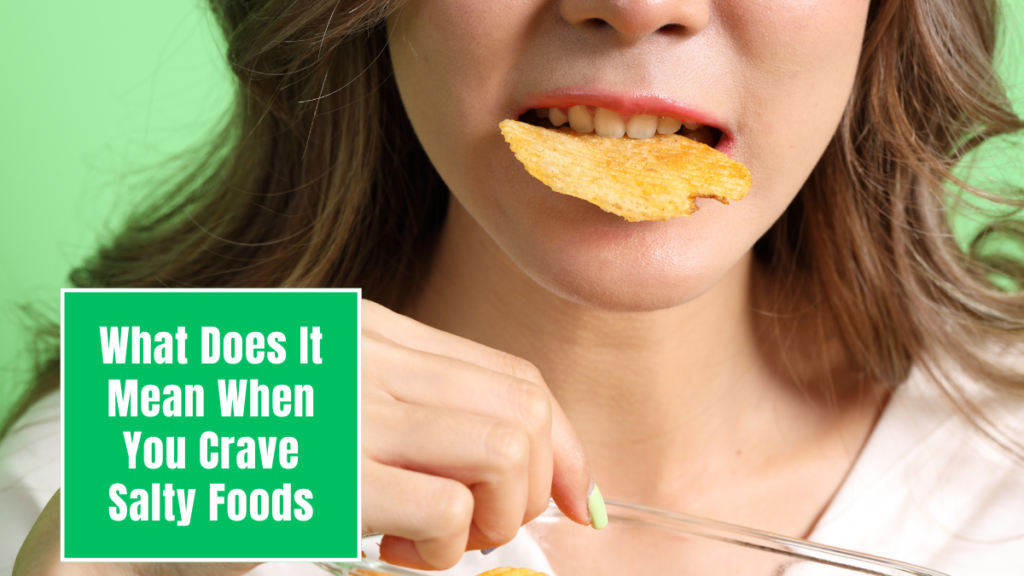Cravings for salty foods are common and can arise for various reasons, from physical to emotional needs. Understanding why you crave salty foods can provide insights into your overall health and help you address any underlying issues. In this blog post, we will explore the potential causes of salt cravings and what they might signify about your body and lifestyle.
Possible Reasons for Craving Salty Foods
| Item | Details |
|---|---|
| Dehydration | A state where the body loses more water than it takes in, affecting overall health and performance. |
| Electrolyte Imbalance | An abnormal level of minerals like sodium, potassium, and calcium can impact muscle function and hydration. |
| Stress Response | The body’s physiological reaction to stress includes the release of cortisol and adrenaline. |
| Hormonal Changes | Variations in hormone levels can affect mood, metabolism, and overall health. |
| Nutritional Deficiencies | Lack of essential nutrients in the diet leads to various health issues and decreased energy levels. |
| Adrenal Fatigue | A condition where prolonged stress leads to insufficient production of cortisol by the adrenal glands. |
| Habitual Consumption | Regular intake of certain substances (e.g., caffeine, sugar) that can impact health and energy levels. |
Dehydration
One of the most common reasons for craving salty foods is dehydration. When your body loses water, it also loses essential electrolytes like sodium, crucial for maintaining fluid balance, nerve function, and muscle contractions. As a result, your body might signal a craving for salt to replenish these lost electrolytes and encourage you to drink more water. If you’re experiencing persistent thirst, dry mouth, or dark urine, these could be signs of dehydration, and your salt cravings might be your body’s way of prompting you to rehydrate.
Electrolyte Imbalance
Electrolytes like sodium, potassium, and chloride are vital in maintaining the body’s fluid balance and supporting nerve and muscle functions. An imbalance in these electrolytes, often caused by excessive sweating, vomiting, or diarrhea, can lead to cravings for salty foods. These cravings are your body’s attempt to restore balance by increasing sodium intake. Electrolyte imbalance can also result from certain medications or medical conditions, making it essential to monitor your cravings and consult a healthcare provider if they persist.
Stress Response
Stress can significantly impact your eating habits, triggering cravings for salty foods. When stressed, your body releases cortisol, a hormone that can increase your appetite for high-energy foods, including those high in salt. This response is part of the body’s natural “fight or flight” mechanism, which prepares you to deal with perceived threats. In modern life, these threats are often more psychological than physical, but the physiological response remains the same, leading to cravings for foods that provide quick energy and comfort, like salty snacks.
Hormonal Changes
Hormonal fluctuations, particularly those related to menstruation, pregnancy, or menopause, can also lead to cravings for salty foods. These changes can affect your body’s sodium levels, fluid retention, and overall metabolism, increasing your desire for salt. For example, during menstruation, women might experience bloating and fluid retention, making the body crave salt to balance out these effects. Similarly, pregnant women often experience shifts in taste preferences and may crave salty foods.
Nutritional Deficiencies
Sometimes, cravings for salty foods can indicate an underlying nutritional deficiency. For example, a lack of minerals like magnesium, calcium, or potassium can cause your body to crave salt to compensate for these deficiencies. In some cases, these cravings might also signal a deficiency in sodium itself, especially if you follow a very low-sodium diet or have been sweating excessively. Ensuring a balanced diet that provides all essential nutrients can help reduce these cravings and improve overall health.
Adrenal Fatigue
Adrenal fatigue, a condition where the adrenal glands are overworked and unable to produce sufficient hormones, particularly cortisol, can lead to salt cravings. The adrenal glands also produce aldosterone, a hormone that helps regulate sodium and potassium levels in the body. When aldosterone levels drop due to adrenal fatigue, the body may crave salt to compensate for the decreased sodium levels. If you’re frequently tired, have trouble waking up, or crave salty foods regularly, it might be worth exploring whether adrenal fatigue could be a factor.
Habitual Consumption
Sometimes, cravings for salty foods are simply a result of habit. If you’re used to eating foods high in salt, your taste buds may become accustomed to that level of saltiness, leading to cravings when your intake decreases. This chronic consumption can create a cycle where your body expects and desires salty foods regularly. Breaking this cycle can involve gradually reducing your salt intake and allowing your taste buds to adjust to lower sodium levels, which can help diminish cravings over time.
FAQs
Is craving salty foods a sign of a health problem?
Craving salty foods is not necessarily a sign of a health problem, but it can indicate underlying issues such as dehydration, electrolyte imbalance, or hormonal changes. If your cravings are persistent or accompanied by other symptoms, it’s advisable to consult a healthcare provider.
How can I reduce my salt cravings?
To reduce salt cravings, stay hydrated, eat a balanced diet rich in essential nutrients, and manage stress levels. Gradually reducing your salt intake can also help your taste buds adjust to lower sodium levels, making salty foods less appealing over time.
Are there healthier alternatives to satisfy salt cravings?
Yes, there are healthier alternatives to satisfy salt cravings. Try incorporating nuts, seeds, or vegetables seasoned with herbs and spices instead of salt. These options provide a satisfying crunch and flavor without excessive sodium.
Can salt cravings be a sign of pregnancy?
Salt cravings can signify pregnancy due to hormonal changes that affect taste preferences and fluid retention. However, cravings alone are not a definitive indicator of pregnancy, and other symptoms should be considered.
What are the risks of consuming too much salt?
Consuming too much salt can lead to various health issues, including high blood pressure, heart disease, and kidney problems. To maintain overall health, it’s important to monitor your salt intake and aim for a balanced diet.
References
- Centers for Disease Control and Prevention (CDC) – Sodium and Your Health
- National Institutes of Health (NIH) – Salt and Sodium
- U.S. Department of Agriculture (USDA) – Dietary Guidelines
- Office of Disease Prevention and Health Promotion (ODPHP) – Sodium Intake
- Food and Drug Administration (FDA) – Reducing Sodium



